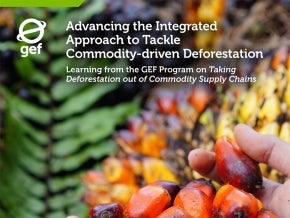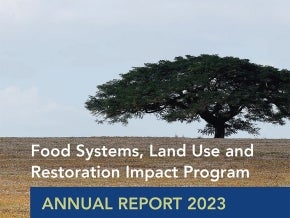
Representatives of the Global Environment Facility’s COVID-19 Task Force joined an International Conservation Caucus Foundation briefing for U.S. Congress members to present research on the links between deforestation, illegal wildlife trade, and health risks from zoonotic diseases, making the case for an integrated approach to tackling these challenges.
During the online briefing hosted by ICCF, a bipartisan congressional organization that helps advance conservation, experts including EcoHealth Alliance President Peter Daszak, Wildlife Conservation Society Associate Director Sarah Olson, and GEF Senior Biodiversity Specialist Mark Zimsky shared trends and recent findings about the drivers of pandemic risk, including those leading up to the COVID-19 outbreak and those contributing to potential future outbreaks.
“It all pulls together,” said Rep. Betty McCollum, chair of the U.S. House Interior-Environment Appropriations Subcommittee. “It is clear our human behavior and our interactions with the environment and wildlife play a leading role in the emergence of these diseases.”
The GEF COVID-19 Task Force is a group of scientific experts working to identify the origins and drivers of the coronavirus pandemic, and to develop a prevention strategy to reduce the risk of other new disease outbreaks. Through their work, the Task Force members are sharing knowledge about zoonotic diseases, wildlife trade, deforestation and land degradation, and behavior change, with the aim of reflecting these insights into the GEF’s programming and operations in an upcoming white paper.
During the briefing, the GEF Task Force members stressed the important role of tropical forest loss in the spread of zoonotic diseases, which jump from animals to humans as the COVID-19 virus did.
“If you track the origins of new diseases over time, they are increasing exponentially,” Daszak said, pointing in particular to Southeast Asia where there is a great deal of viral diversity and wildlife diversity as well as rapid land-use changes. “The exponential rise in underlying environmental factors is driving an exponential rise in pandemics.”
Olson, describing wildlife markets as “cauldrons of contagion,” said that unsafe proximity between people and wild animals was becoming an even bigger problem in combination with deforestation caused by road building, mining, logging, urban expansion, migration, war, monoculture crops, and livestock production.
“We’re in a situation where human activities have broken down natural zoonotic disease barriers and exposed the world to greater infectious disease risk,” she said. “The good news is we can repair those natural barriers and gain numerous human health benefits.”
The GEF is a multilateral trust fund providing grants to developing countries for projects and programs that address biodiversity loss, land degradation, deforestation, climate change, and pollution from plastics, persistent organic pollutants, mercury, and more. It is a partnership of 184 countries working together with civil society and the private sector to advance environmental priorities and restore and maintain ecosystems around the world.
At the congressional briefing, Zimsky presented the GEF-funded Amazon Sustainable Landscape Program as an example of how investing in a connected landscape and intact ecosystem can be a defense against zoonotic disease risks.
“The Amazon is globally important from a biodiversity perspective, it’s the world’s largest freshwater system, and it’s a carbon sink,” he said. “This program in the Amazon and many other GEF programs in other parts in the world are looking at this interface between human land use and forest management to support more sustainable use of forest resources, both through a protection lens and through a sustainable management lens.”
Additional questions for future consideration by the Task Force include the development of improved communication channels between scientists and decision-makers, ways the international community can work together to stop the spread of a new disease once it has started, and how rural and indigenous communities can be better engaged and supported to ensure that efforts to protect forests and end illegal wildlife consumption and trade does not disproportionately hurt them.
“Going forward, increased cooperation on the underlying drivers of deforestation and wildlife trade – and linking those conservation efforts with global health initiatives - will be key,” Daszak told the briefing. “We cannot continue business as usual.”
To view the full briefing, visit: https://www.thegef.org/events/congressional-briefing-gef-and-covid-19-pandemic


